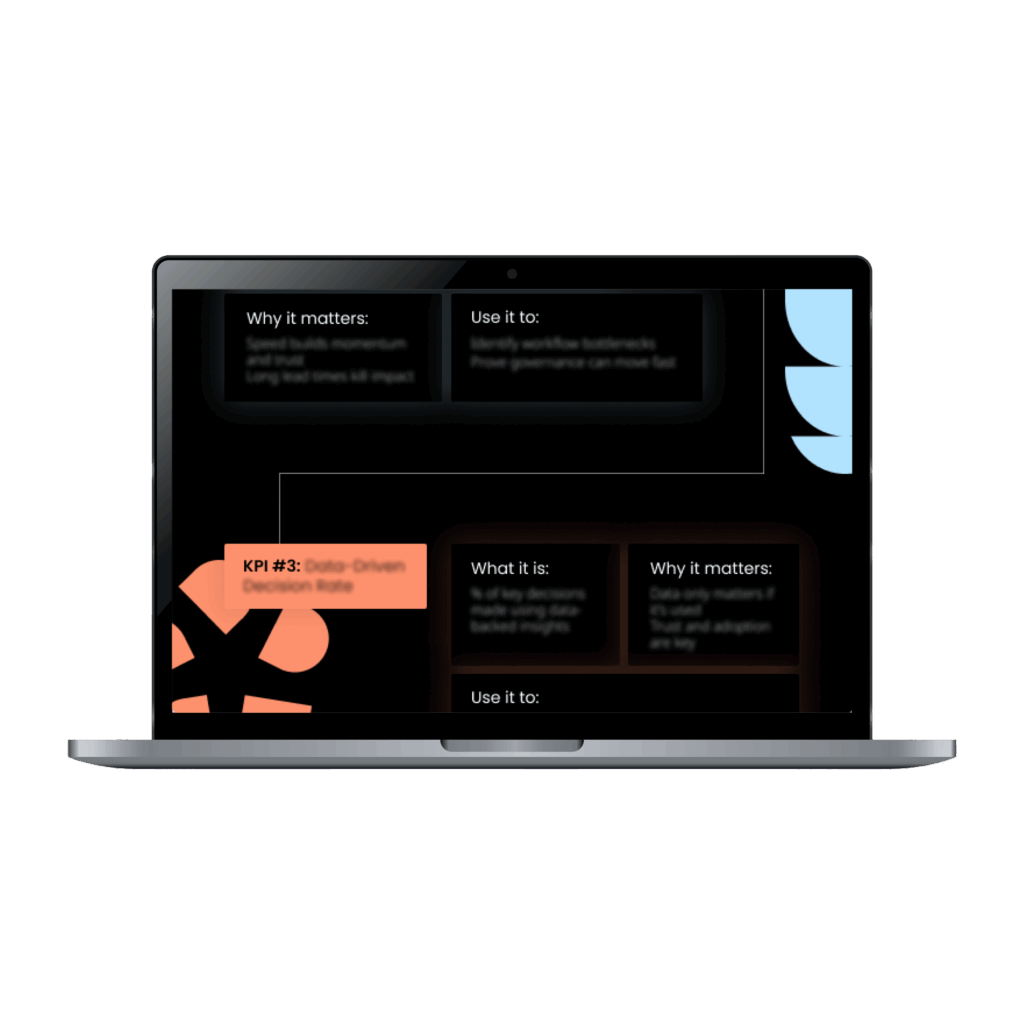
Webinar recap – Building AI readiness & data trust with governance & observability
CDOs and AI leaders face big risks when business opportunities get derailed by a lack of data trust due to low levels of data governance and observability.
Today’s organizations are striving to boost workforce data literacy by delivering clean, reliable data, but scattered IT architectures often make accessibility and usability a challenge.
That’s where DataGalaxy and Bigeye come in. Together, we provide a seamless way to tackle end-to-end analytics governance while ensuring real-time, effortless data monitoring.
This March, DataGalaxy’s VP of Growth, Kash Mehdi, and Bigeye Founder & CPO, Kyle Kirwin, unpacked the biggest data challenges of 2025 and shared how you can make your data AI-ready to hit your business goals.
Keep reading for a look at the key points discussed at our one-of-a-kind webinar with Bigeye.
Building trust & real-world Bigeye use cases
Data governance is a must-have for organizations to unlock the full potential of data and AI. In simple terms, data governance is all about helping data workers understand what data to trust.
For example, the analytics function is the largest consumer of data for any organization, and the analytics community needs high-trust data to create data products.
Observability, on the other hand, ensures that data is healthy and fresh at user usage time. Applying observability standards in high-data-consumer-heavy environments means knowing where data quality is low and how to identify and fix it.
Good data governance and observability have many real-world applications. One example comes from DataGalaxy customer Society Insurance, a niche insurance carrier specializing in the restaurant and bar industry.
Designing data & AI products that deliver business value
To truly derive value from AI, it’s not enough to just have the technology.
Data professionals today also need a clear strategy, reasonable rules for managing data, and a focus on building useful data products.
Read the free white paper
Society Insurance embarked on a 10-month data governance program, which is led by Kirsten Kerr, Data Governance Manager, who also presented her story at the recent Gartner conference. In just 10 months, Society Insurance’s data governance team cataloged 16 key data sources, addressed eight business functions, and covered 10 data domains.
Implementation options & combined value
While there is a big appeal to having an all-in-one platform to do everything, where you have a simplified purchase, integration concerns between different modules, one of the challenges of an all-in-one platform vs. the other is its generic approach and heavy learning experience. Most data leaders today need something intuitive that can accelerate the adoption.
Together, DataGalaxy and Bigeye bring a best-of-breed solution combining data governance, trust, observability, and integration. Find out more in this exclusive webinar recap:
Deep dive into DataGalaxy’s Bigeye connector
Because data quality and observability go hand-in-hand, DataGalaxy and Bigeye are a match made in heaven. Here’s how we work well together:
Quality scores can track all your business metrics
while keeping user experience and data ownership top of mind. This way, you can unleash the full potential of data governance and observability
Monitor quality results in DataGalaxy, powered by Bigeye
Business users are more empowered to create quality standards. Bigeye can then continue to execute on those sensors and report results at each run.
Users can manage data governance & quality remediation workflows
Users who are consuming governance assets can ask questions and request quality remediation that involves both data governance and quality teams.
Audit & monitor
the history of data quality results at the column level through DataGalaxy quality sensors. Know when your data quality fails without switching back and forth between solutions.
At DataGalaxy, we champion data quality, emphasizing accuracy, reliability, and consistency. By pulling data health signals into DataGalaxy, we strengthen our commitment to data integrity and operational excellence, ensuring businesses make informed decisions with confidence.
Data quality is not just about the data itself. It’s about the value it brings to the user.
We define high-quality data as being accurate, complete, reliable, and directly relevant to the needs of our users. This is the core of our data quality philosophy.

The 3 KPIs for driving real data governance value
KPIs only matter if you track them. Move from governance in theory to governance that delivers.
Download the free guideDataGalaxy’s pipeline monitoring tools enable users to detect and address issues in their data flows. By providing visibility into data operations, it’s easier to differentiate between isolated incidents and systemic problems.
This feature also allows for monitoring the health of data by various business units and sources, ensuring that decisions are made on current and reliable data.
Are you interested in joining a future webinar? Discover our upcoming virtual events to save your free seat!
FAQ
- Can DataGalaxy adapt to my organization’s data landscape?
-
Yes. DataGalaxy is built to support hybrid, multi-cloud, and evolving ecosystems. Whether you’re wrangling spreadsheets, Snowflake, or SaaS tools, the platform connects and documents everything — while staying flexible enough to reflect your teams’ real-life workflows, business terms, and governance needs.
- How do you improve data quality?
-
Improving data quality starts with clear standards for accuracy, completeness, consistency, and timeliness. It involves profiling, fixing anomalies, and setting up controls to prevent future issues. Ongoing collaboration across teams ensures reliable data at scale.
- Why is data lineage important?
-
Data lineage is important because it provides visibility into the origin, movement, and transformation of data. It enables regulatory compliance, faster root-cause analysis, improved data quality, and trust in analytics. By mapping data flows, organizations enhance transparency, streamline audits, and support accurate, AI-driven decisions, making it a cornerstone of effective data governance.
- What types of systems can DataGalaxy integrate with?
-
DataGalaxy connects with a wide range of systems including data warehouses, BI tools, data lakes, ETL platforms, and governance frameworks. Supported platforms include Snowflake, BigQuery, Tableau, Power BI, dbt, Talend, Collibra, and many more. Whether your ecosystem is cloud-based or hybrid, DataGalaxy provides flexible integration paths.
- What makes DataGalaxy easier to adopt than Collibra?
-
DataGalaxy is designed for collaboration-first governance — with faster deployment, lower training overhead, and role-based navigation tailored for real workflows.
